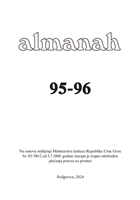Kadije Bihorskog kadiluka
Kadi of the Bihor Kadiluk
Author(s): Sait Š. ŠabotićSubject(s): Cultural history, History of Law, Social history, The Ottoman Empire, Sociology of Law, Sharia Law
Published by: Almanah
Keywords: Ottoman Empire; caddy; naib Sharia law; education; incense; Bihor; court cases; legal jurisdiction;
Summary/Abstract: Qadis were key figures in the legal system of the Ottoman Empire. They were responsible for the application of Sharia law in the local community, making judicial decisions, and resolving disputes among the Muslim population. They enjoyed great prestige and respect in their communities. They were appointed by the sultan or high officials. The training of qadis usually included the study of Islamic law, theology, and the Arabic language. The spectrum of their jurisdiction was quite wide, including conducting court proceedings, resolving civil and family disputes, applying criminal law, and collecting taxes. As part of the administrative system of the Ottoman Empire, qadis had a certain autonomy. It was their duty to judge impartially and fairly, regardless of the origin or social status of the parties to the dispute. Qadis left a strong influence on the society and culture of the countries that were part of the Ottoman Empire, and their legal system and legacy continued to shape the judicial systems of many modern states in the Middle East, the Balkans, and other areas. This paper, based on first-class historical sources and literature, provides an overview of the activities of individual kadis in the Bihor kadiluk, the spectrum of their jurisdictions, and the results of their concrete activities. The aim of the paper is to present, in the most objective light possible and with the help of valid historical sources and the facts contained therein, the ramifications of the Ottoman legal system and the care that was given to even the lowest administrative units of the Empire.
- Issue Year: 2024
- Issue No: 95-96
- Page Range: 131-155
- Page Count: 25
- Language: Montenegrine
- Content File-PDF

